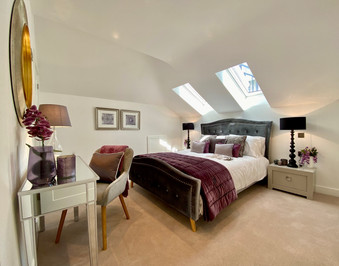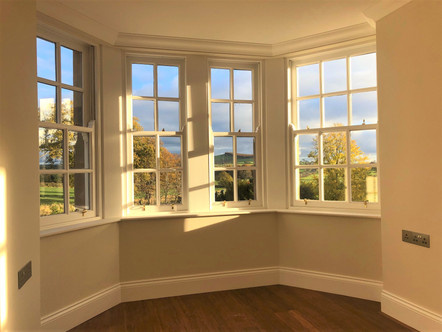
How can I increase the natural light in my house? It’s a regular query, and understandably so given the enormous benefits of natural light to health and wellbeing. Some studies have also shown that Vitamin D, absorbed through our skin when exposed to sunlight, could help reduce the risk of catching the coronavirus or avoid suffering more severe effects of infection.
Ensuring that we receive adequate levels of natural light at the appropriate times of day benefits our alertness, mood, productivity, sleep pattern and many aspects of our physiology.
At Scalesceugh Hall & Villas, we’ve greatly invested in the window designs of our properties to ensure that generous natural light is flooded throughout the home. As well as creating impressive design features that allow our homes to be light and bright, our clever window designs will reduce energy consumption in terms of providing artificial light, reducing your electricity bill.
The majority of our Scandinavian-inspired villas boast striking full-height windows to the front, as well as full height glass patio doors to the rear and sky lights in the bedrooms – all of which create an abundance of light throughout all spaces of the home. All windows and patio doors in our villas are of a Danish triple glazing equivalent Futura+ design and boast a slim aluminium profile which ensures maximum glass area and natural light, as well as being highly insulated with optimum energy efficiency.
Our apartments in Scalesceugh Hall feature a range of striking window designs that are as aesthetically pleasing as they are practical. Our apartments on the ground and first floor have grand double-glazed sash windows in keeping with the hall’s original Edwardian design - many of which are 2.5 metres high. Many of these apartments boast impressive bay window designs, with multiple windows flooding generous natural light into the living areas and offering stunning views of the surrounding grounds and countryside.
Within the top floor of Scalesceugh Hall, there are a number of unique window designs in each of the apartments that provide bursts of natural light throughout the home. Some properties feature full-height windows and glass doors leading out to balconies, whilst one includes cabrio windows in the master bedroom which fold out to offer a balcony experience. Many apartments have also been designed with several roof lights, sky lights and sun tunnels, providing direct sunlight through the ceilings. As well as sunshine, the sun tunnels show changes in weather, passing clouds and even moonlight which is reflected through the tunnels to give a totally unique experience in various living spaces throughout the home.
Therefore, despite having been required to spend more time indoors during the current pandemic, our residents can still take advantage from ample levels of natural light in their homes and the benefits that this can bring to one’s physical and mental health:
Natural light makes you happier
Doctors and scientists are united in prescribing natural light to boost serotonin - that’s our happy hormone - to combat depression.
In the winter, many people are affected by a type of depression called Seasonal Affective Disorder (SAD), brought on by not receiving enough sunlight.
Natural light helps you sleep
Research supports the relationship between the amount of sunlight you are exposed to and a good night’s sleep.
Natural light requirements increase with age
Light controls the body’s circadian system, which affects mood and perception. As well as reducing depression and improving sleep, it can help people in later years to decrease the length of stays in hospitals, ease pain and reduce agitation if you have dementia.
Natural light boosts vitamin D levels
Vitamin D, which our bodies produce in response to strong sunlight, is extremely important for keeping teeth and bones healthy, helping our nerves and muscles to work properly and maintaining a healthy immune system. Having enough vitamin D in the body, helps to prevent Rickets (in children) and Osteomalacia (in Adults).
The so-called “sunshine vitamin” doesn’t discriminate based on whether you get your sunlight indoors or out, therefore increasing your natural light where you spend the most time, be it home or the workplace, is equally important.

Boosting your levels of vitamin D could help fight Covid-19
Increased research is now focusing on the impact vitamin D could have on reducing the risk of catching the coronavirus or avoid suffering more severe effects of infection. Recent researchers in Spain found that 82% of coronavirus patients out of 216 admitted to hospital had low vitamin D levels.
A clinical trial is also underway in the UK, led by Adrian Martineau, professor of respiratory infection at Queen Mary University in London, to examine whether taking vitamin D can reduce the risk and/or severity of Covid-19, as well as other serious respiratory infections. The CORONAVIT study, backed by the Barts Charity, will follow more than 5,000 people through the winter.
Professor Adrian Martineau comments: “There is mounting evidence that vitamin D might reduce the risk of respiratory infections, with some recent studies suggesting that people with lower vitamin D levels may be more susceptible to coronavirus.
“Many people in the UK have low vitamin D levels, particularly in the winter and spring, when respiratory infections are most common. Vitamin D deficiency is more common in older people, in people who are overweight, and in Black and Asian people – all of the groups who are at increased risk of becoming very ill with COVID-19.”
As our levels of vitamin D are much lower during winter and into early spring as a result of less hours of sunlight, it is important, particularly for those who are at increased risk of respiratory infections such as Covid-19, to take regular vitamin D dietary supplements and incorporate foods which contain vitamin D into their diet. Such foods include oily fish (such as salmon, sardines, herring and mackerel; red meat; liver; egg yolks and fortified foods (such as some fat spreads and breakfast cereals). The NHS recommends that that people should take 10 micrograms (400 IU) of vitamin D a day between October and early March to keep your bones and muscles healthy.
Although we may be experiencing less sunlight in the current months, it is clear there are a number of benefits to maximising the amount of natural light in our homes for a better quality of life.

Dr Anita Herdeiro, co-founder of Scalesceugh Hall & Villas, says: “Having worked internationally in both the Mediterranean - where there is 30% more light than in Cumbria - and Scandinavian countries, we understand the importance that light and space have in people's lives.
“Conditions such as SAD have been recognised as a fundamental problem in places like Scandinavia and Cumbria, but rather than just looking at medication and light therapy, let us embrace the way people live.”
Many studies have shown that buildings can impact a person’s health, especially with people in developed countries spending as much as 90 per cent of their time indoors. Architects, therefore, have been playing a more important role in designing buildings which let in natural light. But they can often be restricted by tight budgets and planning laws.
Dr Anita Ray-Chowdhury Herdeiro adds: “Architecture has a key factor to play in embracing the way people live. Look at the The All Party Parliamentary Group on Housing and Care for Older People here.”
“Architects came together with clinicians to understand societies and ageing better. Countries like Sweden are light years ahead in seeing how societies and health benefit from the way homes are designed. We have created that sustainable, light and spacious lifestyle here in both our villas and apartments. We are retirement by name but definitely not by nature.”
Our villas are now fully reserved, however you can still register your interest in the event that one becomes available again.
To find out more about our apartments and their designs, click here.































Comentários